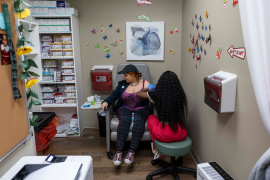NEW YORK, May 23, 2011—More than eight of 10 leaders in health and health care policy (82%) believe states should be allowed to implement key provisions of the Affordable Care Act early with full federal support, ahead of the timeline outlined in the law. Such key provisions include expanding Medicaid eligibility to cover more low-income families and creating insurance exchanges with premium subsidies. Findings are from the latest Commonwealth Fund/Modern Healthcare Health Care Opinion Leaders Survey, which asked respondents about the relative authority states and the federal government should have implementing health care reform.
There are wide differences of opinion in Congress and among industry experts about the degree to which the federal government or individual states should have authority over health reform. When asked about the overall state–federal balance in the Affordable Care Act, 41 percent of opinion leaders said the federal government should have more authority and 29 percent say that the law has struck an appropriate balance between states’ and the federal government’s roles. Only 25 percent of respondents thought the states should have more authority.
On many health care reform provisions, opinion leaders were somewhat more likely to think the federal government should have a stronger role. For instance, under the law, new federal rules will prohibit insurers from restricting coverage or basing premiums on health status or gender. Half of health care opinion leaders support granting the federal government more power to set such health insurance market rules; 23 percent feel the law got the balance between the federal government and states about right. In addition, half of respondents favor a stronger role for the federal government in developing and spreading innovative provider payment methods, including new models like accountable care organizations and patient-centered medical homes.
A wide majority of opinion leaders expressed concerns about the barriers states face in successfully implementing the law. Nearly nine of 10 (89%) are concerned or very concerned about the current fiscal situation and budgetary pressures in many states. In addition, more than 70 percent are concerned about state political resistance and legal challenges (78%) and technical knowledge and capacity of state agencies (71%).
“The strong support voiced by health care leaders for federal support of early state implementation of the Affordable Care Act indicates a vote of confidence in the benefits of the new law,” said Commonwealth Fund president Karen Davis. “Leaders have also expressed concerns about barriers to implementation, such as capacity of state agencies and budget pressures, which policymakers must address to facilitate effective implementation of the law.”
Other findings from the survey include:
- A majority of opinion leaders (61%) support or strongly support the creation of a federal health insurance exchange, in addition to the state exchanges that will become operable in 2014.
- Health care opinion leaders are divided on whether states should be given the ability to design their own approaches to health care reform as long as they achieve the same results. About half (49%) support this idea, 32 percent oppose it, and 18 percent neither support nor oppose.
- A plurality of leaders think there should be more federal authority over the health insurance exchanges (42%), the individual mandate (41%), and medical malpractice (40%).
The survey is the 25th in a series from The Commonwealth Fund, and the 17th conducted in partnership with the publication Modern Healthcare. Commentaries by Jim Douglas, the former governor of Vermont, and Michael McRaith, director of the Illinois Department of Insurance, appear in the May 23 issue of Modern Healthcare. The commentaries are also posted on The Commonwealth Fund’s Web site, along with a Commission data brief discussing the survey findings.
Methodology: The Commonwealth Fund/Modern HealthCare Health Care Opinion Leaders Survey was conducted online within the United States by Harris Interactive on behalf of The Commonwealth Fund between April 6, 2011, and May 3, 2011, among 1,246 opinion leaders in health policy and innovators in health care delivery and finance. The final sample included 203 respondents from four sectors: academic/research institutions, health care delivery, business/insurance/other health care industry, and government/labor/consumer advocacy, for a response rate of 15.6 percent. The complete methodology is available on The Commonwealth Fund Web site.


